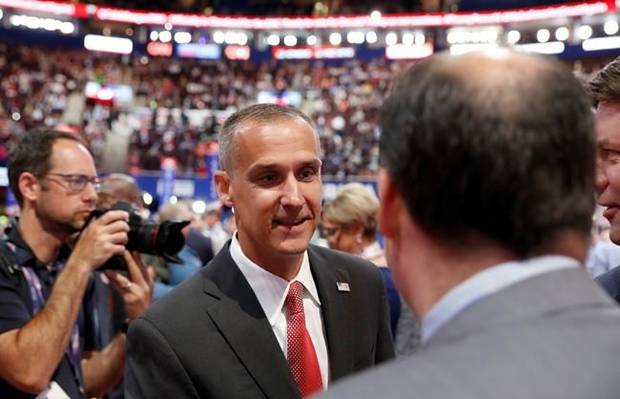In the brief and tumultuous political life as Donald Trump's right-hand man, Paul Manafort can count few wins.
On Friday morning, the operative brought in to stabilize and lead the Republican presidential candidate's campaign abruptly resigned. His star was already fast fading in the Trump orbit.
The campaign shakeup this week that catapulted right-wing media mogul Stephen Bannon to the top of the Trump hierarchy had still left a spot for Mr. Manafort as campaign chairman. But there was little doubt: Mr. Manafort had been sidelined.
Here is the story of how a veteran Republican operative arrived on the Trump scene, how his efforts to steady a listing campaign fell short, and what ultimately made him toxic.
Donald Trump gives a thumbs up as his campaign manager Paul Manafort and daughter Ivanka look on during Trump’s walk through at the Republican National Convention in Cleveland in July.
RICK WILKING/REUTERS
The arrival of Manafort
Paul Manafort was the solution to a nagging problem: a stop-Trump movement aiming to block the real-estate billionaire from getting the 1,237 delegates he needed in order to become the presumptive Republican nominee.
It all seems like a faint memory – and, in retrospect, a lot of anguish expended over something that never unfolded: a convention floor fight that would wrest control of the nomination process from the Trump campaign and pick an alternative to lead the party in November.
But, in March, the panic among Trump opponents and the Republican establishment was real: Donald Trump was rolling through state primaries like a runaway train.
Mr. Manafort's role, beginning in March, was to guide the delegate-selection process and to ensure that Mr. Trump left Cleveland as the Republican presidential nominee.
By all accounts, Mr. Manafort was the best person for the job. He helped Gerald Ford beat off a convention-floor challenge in 1976 by Ronald Reagan – and he had several other convention battle scars to prove it.
Paul Manafort prepares for an interview on the floor of the Republican National Convention at the Quicken Loans Arena in July.
WIN MCNAMEE/Getty Images
The rise of Manafort
A power struggle in the Trump campaign in June sent long-time campaign manager Corey Lewandowski packing.
At the heart of the turmoil was a lingering question from the Republican nominating contests in the winter and spring: What kind of candidate should Donald Trump be in the general election?
Mr. Lewandowski trumpeted a freewheeling, "let Trump be Trump" approach and a small, nimble national organization to support the candidate. After all, the strategy had worked during the primaries.
But Mr. Trump's children, according to U.S. media reports, urged him to create a more robust national organization with a more disciplined message.
That would be Mr. Manafort's task: tame a volatile presidential candidate with scripted, Teleprompter-aided speeches and get the campaign battle-ready for the autumn.
Neither happened. Mr. Trump could not help but be himself – and the Trump campaign never matched Hillary Clinton's campaign in fundraising, ground organization and TV ad spending.

Corey Lewandowski talks to delegates as he arrives to the floor of Quicken Loans Arena during first day of the Republican National Convention in Cleveland.
Carolyn Kaster/AP
The fall of Manafort
Donald Trump's love of polls is no secret.
He taunted his Republican rivals throughout the primaries with poll after poll showing him trouncing his rivals.
But the period after the Republican convention in July has consistently shown Ms. Clinton leading in battleground states. There is growing chatter within Republican and political classes that Mr. Trump is heading for a historic defeat in November.
The Trump team shakeup this week – which Mr. Trump called an "expansion" – was the final admission that the Manafort strategy to contain and keep Mr. Trump on message was never taken to heart by the candidate himself.
The presidential campaign has now officially entered the "let Trump be Trump" phase – and how (and whether) that is going to change the trajectory of the race in the Trump campaign's favour is anyone's guess.
But there was another problem: The drip of news stories chronicling Mr. Manafort's ties to pro-Russia groups in Ukraine and undeclared U.S. lobbying efforts pointed to the role of hidden money in politics and against American interests.
That made the veteran Republican operative too toxic a figure to keep at Trump Tower in New York.
Ukrainian journalist and member of parliament Serhiy Leshchenko holds pages allegedly showing signings of payments to Paul Manafort from an illegal shadow accounting book of the party of former Ukrainian president Viktor Yanukovych, a pro-Russia politician ousted in 2014.
SERGEI SUPINSKY/AFP/Getty Images
What Trump and the Clinton camp are saying
Donald Trump statement:
This morning Paul Manafort offered, and I accepted, his resignation from the campaign. I am very appreciative for his great work in helping to get us where we are today, and in particular his work guiding us through the delegate and convention process. Paul is a true professional and I wish him the greatest success.
Robby Mook, Clinton campaign manager:
Paul Manafort’s resignation is a clear admission that the disturbing connections between Donald Trump's team and pro-Kremlin elements in Russia and Ukraine are untenable. But this is not the end of the story. It’s just the beginning. You can get rid of Manafort, but that doesn't end the odd bromance Trump has with Putin.
Mark Paustenbach, Democratic National Committee:
Despite today’s latest staff shake-up, Donald Trump’s campaign still maintains strong ties to Russia and pro-Kremlin elements. At least a half-dozen of Trump’s remaining aides have Russian connections, and let’s not forget about his own financial interests in the region, as well as his repeated praise for Putin.
MORE FROM THE GLOBE AND MAIL
Video: Trump campaign chairman Paul Manafort resigns
0:47

